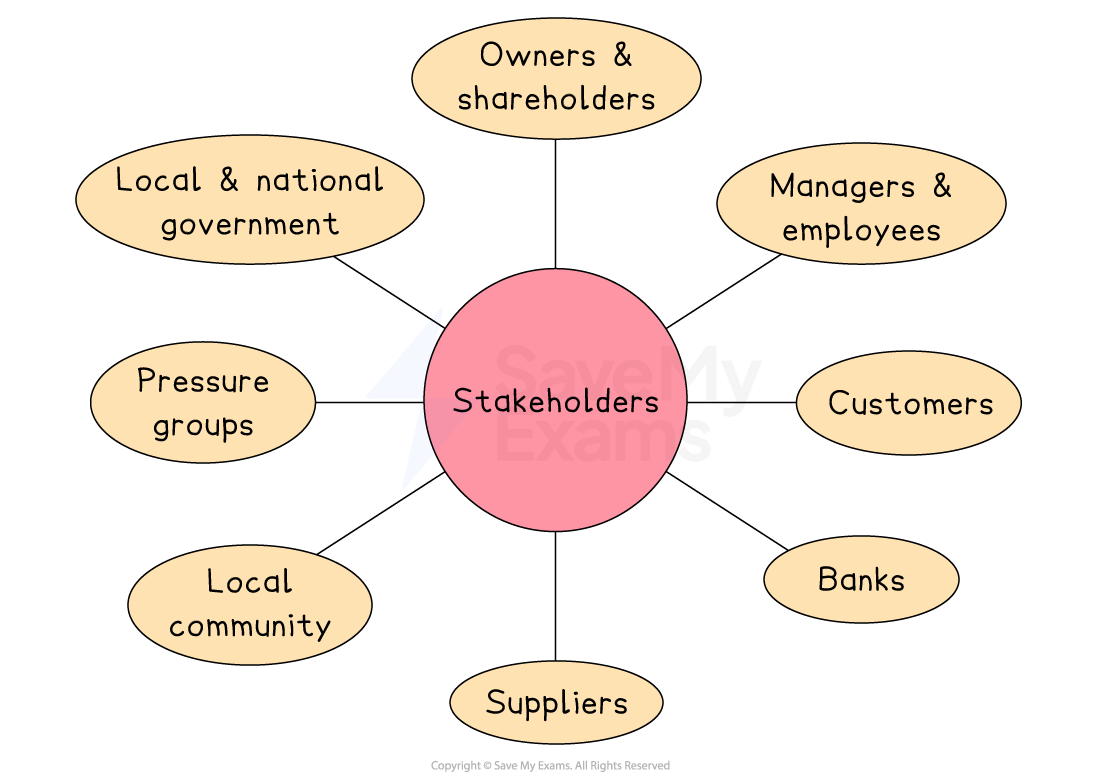Internal Stakeholders (SQA National 5 Business Management): Revision Note
Exam code: X810 75
Introduction to stakeholders
Stakeholders are individuals or groups that affect, or are affected by, the actions of a business
Internal stakeholders are individuals or groups within a business that often have a strong influence on business objectives and decisions
The main internal stakeholders are owners, including shareholders, and employees
External stakeholders are individuals or groups outside a business who are affected by its activities or can influence its decisions, but are not directly part of the organisation
The main external stakeholders are customers, suppliers, the local community, the government, banks and other lenders, and pressure groups
Internal and external business stakeholders

Owners and shareholders
Owners are the individuals or groups who legally control a business
They take on the financial risks involved and hope to benefit from its success
Shareholders are people who own shares in a limited company
They may hold just a few shares or a significant proportion, but either way they are entitled to a share of the profits
Some owners choose to actively run the business day-to-day, while others prefer to appoint managers to make decisions on their behalf
This can sometimes cause tension if managers’ decisions do not match the owners’ expectations
What do owners and shareholders want?
Profit
Owners expect the business to generate enough profit to ensure survival and fund growth
Dividends
Shareholders in companies hope to receive regular dividend payments from their investment
They also want their investment to increase in value
Business growth and stability
Owners and shareholders want the organisation to be financially secure and competitive
Influence
Shareholders can vote on important matters, such as appointing or removing directors at the Annual General Meeting (AGM)
How do owners and shareholders influence business decisions?
Investment
Owners and shareholders can put more money into the business to fund growth or withdraw it if they lose confidence
Strategic control
At company meetings, they can vote to change the direction of the business or replace leadership
Expectations
Their demands for high profits or strong ethical standards influence management decisions
Case Study
Dundee Coffee Ltd is a chain of cafés. It has several private shareholders, including the original founders and local investors.

Its owners’ needs include earning a healthy profit and maintaining a strong Scottish brand identity.
They expect the business to expand into other cities.
Shareholders recently influenced a decision to invest in mobile ordering technology, arguing it would boost sales and customer loyalty.
However, some shareholders were concerned about rising costs and pushed back against opening too many new branches at once.
At the AGM, the owners voted to replace one director who had failed to deliver on agreed growth targets.
Employees
Employees — from managers to frontline staff — are vital to the success of any organisation
Their performance, decisions, and motivation directly affect the reputation, efficiency, and profitability of a business
What do employees want?
Job security
Knowing their employment is stable and they will continue to have paid employment in the long term
Fair pay
Wages that reflect their contribution and allow them to maintain living standards when living costs rise
Good working conditions
Safe, comfortable workplaces and supportive managers and colleagues
How do employees influence business?
Influence | Explanation |
|---|---|
Productivity |
|
Customer service |
|
Industrial action |
|
Managers
Managers are trusted by owners to oversee the day-to-day running of the business
They are responsible for leading teams, setting targets, and ensuring that staff deliver high-quality work and customer service
They also report results back to the owners or shareholders
What do managers want?
Career progression
Opportunities for promotion and personal development
Rewards
Financial incentives such as bonuses linked to performance
Security
Confidence that their role is safe if the business performs well
How do managers influence business?
Influence | Explanation |
|---|---|
Recruitment and dismissal |
|
Creating policy |
|
Staff motivation |
|
Making decisions |
|
Examiner Tips and Tricks
When asked about employees, always show the link between their interests (pay, conditions, security) and their influence (productivity, service, industrial action). Managers should be treated as employees too, but with the added responsibility for decision-making.

Unlock more, it's free!
Was this revision note helpful?
